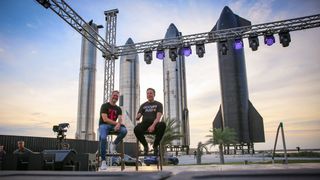T-Mobile uses SpaceX satellites to extend 5G network in US
Partnership will connect half a million square miles of the US

However, the company says there are half a million square miles of the US and vast stretches of ocean that lack cellular coverage from any provider
US mobile operator T-Mobile is partnering with Elon Musk’s SpaceX satellite venture to bring its mobile network to the most remote parts of the country.
T-Mobile claims its 5G network now covers 315 million people in the US, with 225 million of those able to access it fastest ‘Ultra Capacity 5G’ service. The latter figure is expected to reach 260 million later this year and 300 million in 2023.
T-Mobile SpaceX
In some areas, such as deserts and mountain ranges, there are logistical and economic challenges, while in national parks there are land-use restrictions that prevent the installation of masts.
Satellite phones have been one way to stay connected in such locations, but these are expensive and use legacy technology. A new generation of Low Earth Orbit (LEO) satellites that deliver significant advances in speed, capacity, and low latency are now a viable alternative to fixed connectivity.
Starting next year, T-Mobile customers will automatically connect to SpaceX’s ‘Starlink’ constellation of LEO satellites when they are out of reach of a terrestrial signal. Initially, customers will only be able to send texts and access messaging apps, but voice and data coverage will be added in the future.
Crucially, the network will be compatible using existing radio technology, specifically T-Mobile’s mid-band spectrum, meaning it will work with existing devices.
Are you a pro? Subscribe to our newsletter
Sign up to the TechRadar Pro newsletter to get all the top news, opinion, features and guidance your business needs to succeed!
“We’ve always thought differently about what it means to keep customers connected, and that’s why we’re working with the best to deliver coverage above and beyond anything [that] customers have ever seen before,” said Mike Sievert, CEO of T-Mobile. “More than just a groundbreaking alliance, this represents two industry-shaking innovators challenging the old ways of doing things to create something entirely new.”
“The important thing about this is that it means there are no dead zones anywhere in the world for your [mobile] phone,” said SpaceX Chief Engineer Elon Musk. “We’re incredibly excited to do this with T-Mobile.”
Other operators are also looking at satellite as a way of enhancing their converged networking strategies. Telefonica, for example has partnered with OneWeb, the satellite broadband firm part owned by the British government.
- We've picked out some of the best mobile phone deals
Steve McCaskill is TechRadar Pro's resident mobile industry expert, covering all aspects of the UK and global news, from operators to service providers and everything in between. He is a former editor of Silicon UK and journalist with over a decade's experience in the technology industry, writing about technology, in particular, telecoms, mobile and sports tech, sports, video games and media.
Most Popular

